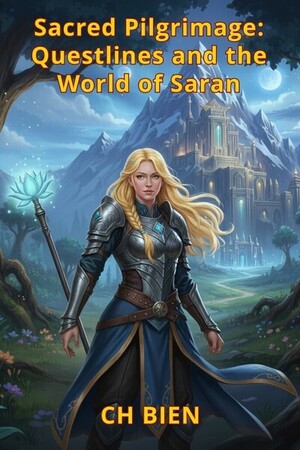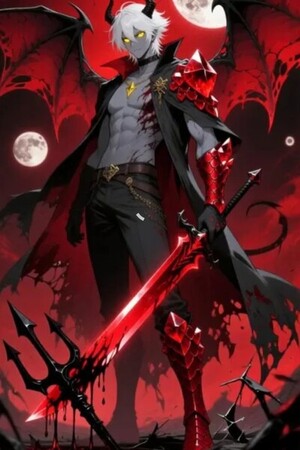Chapter 6:
Rheinsted City Arc part 3
Sacred Pilgrimage: Questlines and the World of Saran
The Border Pavilion
The Border Pavilion stood like a temple on stilts above the water, its eaves carved with cranes and dragons. Lanterns flickered in the mist, reflecting off the river like small suns.
Inside, the air smelled of jasmine and ink.
Lady Qiu Lan sat at a low table, her robe a pale shade of blue — the color of calm seas. She looked up as I entered, eyes sharp as glass yet soft in tone.
“So, the Empire sends a messenger who isn’t a soldier,” she said. “A wise choice. Soldiers tend to shout before they speak.”
I placed the letter on the table. “From Mayor Aldren Caine. He said it was written in good faith.”
“Good faith,” she echoed. “That’s a rare commodity these days.”
She broke the seal delicately, reading in silence. Her expression didn’t change, but I caught the faintest tension in her jaw — surprise, maybe, or something else entirely.
Finally, she set the letter down. “He means it. That’s… unexpected.”
Her gaze shifted back to me. “Tell me, courier — do you believe in peace between our nations?”
I hesitated. “I believe in tired soldiers. Hungry farmers. People who’d rather trade stories than wounds. If peace helps them, then yes.”
She smiled — genuinely this time. “A good answer. Not the one I expected.”
From her sleeve, she withdrew a small pendant: a smooth riverstone, carved into the shape of a droplet, bound with silver thread.
“Take this,” she said. “A token of safe passage. And… a promise that when you next cross this river, not all eyes will see you as an enemy.”
I bowed slightly, unsure if I’d earned it or if she simply wanted me gone before the guards returned.
Return to Rheinsted
By the time I stepped back onto the western dock, the sky had deepened to violet.
Mayor Caine waited by the customs office, cloak drawn tight against the wind. When I handed him Qiu Lan’s reply — a single folded page — he read it once, then exhaled.
“She accepted,” he murmured. “Saints preserve us… maybe we still have a chance to avoid another border war.”
He looked at me. “You handled yourself well. With discretion. That’s rarer than loyalty, these days.”
He pressed a small pouch into my hand. Silver coins, heavier than I expected.
“One more thing,” he added. “Keep that riverstone she gave you. I’ve heard her people don’t give such things lightly.”
I nodded, feeling the cool weight of the pendant in my palm.
The moon rose as I walked back through the quiet streets of Rheinsted, the pendant glowing faintly in the pale light — not magic, not truly. Just reflection.
But for the first time in weeks, the river didn’t feel restless. Only watchful.
As if it, too, was waiting to see whether peace could hold.
Whispers Beneath Gold
(Epilogue of the Rheinsted Arc)
The Kwo Ning River gleamed like molten gold under the morning light. It always did — but this time, it looked different. Still. Peaceful. Almost forgiving.
Rheinsted was the same as ever — fishermen shouting at lazy apprentices, guards half-asleep on duty, the smell of roasted barley drifting from the market square. But something under the city’s calm had shifted.
Letters had been delivered. Smugglers unmasked. Demons burned to ash.
And yet, standing at the riverside, I couldn’t shake the feeling that the water itself was holding its breath — as if waiting for what would come next.
Mayor’s Summons
Mayor Sir Aldren Caine summoned me once more to his riverside office. He looked less weary than before, a cup of tea steaming beside his endless stacks of correspondence.
“I read Lady Qiu Lan’s reply,” he said without preamble. “She’s agreed to extend trade access for another season. And… she thanked me for ‘choosing a courier with a clear heart.’ That’s you, apparently.”
He chuckled softly. “Not bad for a freelancer with no seal or rank.”
I shrugged. “Maybe she just liked my handwriting.”
He smiled. “You’ve done more for this border than most uniformed diplomats. But Rheinsted’s quieting down now. And I suspect someone like you doesn’t stay still for long.”
He reached into his drawer and produced a folded letter — this one bearing a silver wax seal marked with the crest of a sword and quill: the Adventurers’ Guild of Zarath.
“I’ve written you a recommendation,” Caine said. “Valenhold will need people who can fight and think. People who can keep the Empire from tearing itself apart, one small task at a time.”
I took the letter carefully. “You’re sending me west, then?”
He looked past me, out the window at the shining river. “Not sending. Just… giving you a door. What you do with it is your choice.”
Farewells
The market was bustling again when I left the mor’s hall. I stopped by Postmaster Elric’s cluttered office, where he was, as always, buried in ink and scrolls.
He peered up at me through smudged lenses. “Off to another job, eh? Just when I was about to trust you with something truly dreadful — like inventorying crates.”
“I’ll pass,” I said. “My luck with paperwork isn’t great.”
He grinned. “Fair. Still, you did right by this city. The ferrymen still talk about the courier who crossed the river and came back richer, not dead. Take care of yourself — and keep an eye on that pendant. Riverstones remember their owners.”
From the docks, Sergeant Helmar waved as I passed. “Heading west?”
“Valenhold,” I said. “Guild work.”
He nodded approvingly. “Then keep your head down and your blade up. And if the water starts glowing again, send word.”
The River’s Whisper
That night, before leaving Rheinsted, I returned once more to the riverbank. The moon hung low, turning the Kwo Ning into a silver ribbon.
I took the riverstone pendant from my neck and let it rest in my palm. Its surface pulsed faintly — like a heartbeat, like the rhythm of the river.
When I closed my eyes, I heard faint voices — whispers layered over the sound of flowing water. Not words, not quite, but meaning all the same: thank you.
I looked upriver. The old watchtower ruins still stood against the horizon, quiet now. No red glow, no movement — just reflection.
For the first time, the river didn’t feel heavy with memory. It simply flowed — forward, unbothered, endless.
Westward
At dawn, I joined a small caravan leaving Rheinsted for Valenhold. The road wound through golden fields and misty hills, the kind of calm that hides danger at its edges.
As the city faded behind us, I caught one last glimpse of the river — the light of sunrise turning it bright as a mirror.
The ferrymen always said the Kwo Ning carried whispers to those who listened. Maybe they were right. Because as the wind shifted, I could almost hear it say my name — then fade into laughter, soft and familiar.
I touched the pendant once more, tucked it beneath my collar, and faced the road ahead.
Rheinsted was safe for now. The river’s secrets were quiet — for now. And beyond the hills waited Valenhold, the Adventurers’ Guild, and a hundred stories yet to be written.
Imperial Historical Compendium of Saran
As recorded by Magister-Archivist Thelon Agrappil of the Imperial Academy, Zarathil City, Anno Victoriae 1012.
I. The Mythic Chronicle — The Fall of the Geneus and the Dawn of Man
“Before the quill of man first scratched upon parchment, the gods had already written the rise and fall of those who deemed themselves greater than heaven.”
In the earliest epochs, the world of Saran was ruled not by man, but by the Geneus — beings of radiant form and immense power, believed to have been the favored children of the divine. They built cities of light and wisdom, their crowning glory being the Grand Temple of Jana, where the gate to heaven itself was said to stand.
Yet even paradise breeds pride. When the mortal Heidan was summoned from another realm and declared by God to be His chosen emissary, the Geneus refused to kneel. For this defiance, they were banished from Jana and stripped of divine grace.
As generations passed, humanity spread across Saran. The beasts that had served the Geneus grew in mind and spirit, becoming the Beastkins. Together, these races forged new kingdoms, and the Geneus, embittered and envious, turned to forbidden sorcery in pursuit of their lost dominion.
From this age of pride and betrayal arose the Tragedy of Heidan’s Sons — Reave and Tasan — whose fraternal strife, poisoned by Geneus deceit, birthed the first vampires, creatures of corruption and hunger. The blood of Tasan, sanctified and spilled, became both curse and covenant — a reminder of the frailty of mortal virtue.
In humanity’s darkest hour came the Prophet Illia, who led the survivors to Valla, the Promised Sanctuary. There they prayed for deliverance — and the heavens answered in fire. The Jana Gates opened once more, and the Geneus, thinking themselves forgiven, entered in triumph. But the gates cast them down instead, their beauty twisted into hatred. Thus were born the Demons, the Akuma, the eternal exiles of light.
From that day, mankind’s struggle has ever been the same: to endure, to resist corruption, and to prove worthy of the divine trust first placed in Heidan.
II. The Early Human Settlers (6772–6732 Before Victory)
“In the ashes of divinity, man found soil for his own beginnings.”
The earliest recorded migrations of humankind into Saran date to approximately 6772 BV. Primitive yet guided by inherited faith, they founded the First Sovereignty — a loose confederation of clans united by reverence for the One God. This age marks the first shaping of mortal civilization after the fall of the Geneus.
III. The Geneus War (6732–6666 BV)
“The last war of gods, fought by mortals.”
The Geneus, unwilling to accept their loss of grace, waged open war against humankind. Entire kingdoms burned as their sorceries tore the sky. Yet in 6666 BV, divine judgment struck once more: the Geneus were banished beyond the mortal realm. Their remnants, both monstrous and spectral, haunt the forgotten corners of Saran still.
IV. The Ancient Ages (6666–13 BV)
“The long dawn of mortal empire.”
For millennia, humankind rebuilt amidst scattered ruins. Legends abound from this age, though reliable records are few. It was during this period that the Kingdom of Zarath arose along the River Auris (753 BV), later becoming the Zarath Republic (509 BV) and, in time, the Zarath Empire (27 BV).
The era is marked by myth, migration, and the first organized study of magic — the foundation of the Imperial Scholarium itself.
V. The First Demon War (13–0 BV)
“When the gates opened once more, it was man who stood against the abyss.”
Around 13 BV, the veil between worlds weakened, and Jana Gates began appearing across Saran. Demons — the twisted descendants of the Geneus — poured forth. Across continents, humanity fought for survival.
Victory came at a terrible cost. In 0 AV, an unnamed Hero slew the Demon King, sealing many of the gates. The world entered a new reckoning: the Anno Victoriae, the Year of Victory.
VI. The Dragons’ War (33–45 AV)
“The earth itself rose to test the heirs of Saran.”
Barely a generation after the First Demon War, the dragons awoke — mighty creatures claiming dominion over the sky and flame. Their near-immortality ended only when mages of the Empire devised the Soul Binding, a method to imprison draconic essence and prevent resurrection.
By 45 AV, the dragons fell, marking humanity’s second great triumph and securing the empire’s claim as guardian of the mortal world.
VII. The Middle Period (45–967 AV)
“An age of crowns, faith, and folly.”
This long era, once called the Post Great-Wars Period, saw the consolidation of human power across the continents.
212 AV — The Zarath Empire annexed the northern marches near Valeria, expanding its dominion.
414 AV — Mass migrations from Valeria to Ardellon followed plague, volcanic eruption, and unrest.
500 AV — The Radiant Church was founded; the Knights of Radiance began their inquisition against demonic influence.
789 AV — The Macchian Revolution swept through Ardellon, overthrowing tyranny but plunging the continent into war.
823–865 AV — The Kingdom of Valeria rose and fell, absorbed by the ever-growing Zarath Empire.
This age is remembered for human unity — and human ambition.
VIII. The Beasts’ War (967–999 AV)
“When the children of the wild demanded their due.”
In 967 AV, the Carnari tribes of Ardellon rose in rebellion against human dominion. The war raged for three decades, culminating in the formation of the Carnari Kingdom and the loss of Esseda City, sacred to both Church and Empire. Though the beasts achieved independence, the scars of the conflict endure in Ardellon’s fractured politics.
IX. The Second Demon War (999 AV – Present)
“The cycle begins anew — and so the heavens send another champion.”
The year 999 AV saw a calamity long feared: the fall of Esseda City to demonic corruption, marking the dawn of the Second Demon War. Darkness spreads once more across Saran, and the threat of Jana Gates stir again.
In 1011 AV, by divine will or desperate summoning, a Hero from another world appeared — echoing the first emissary, Heidan, who once brought wisdom to man. Scholars now debate: is this the herald of final victory, or merely the turning of an eternal wheel?
Only time shall record the answer.
“Thus ends the Chronicle of Ages. Let those who read remember: kingdoms rise, demons return, and history, like the tide, bears us ever toward the shore of judgment.”
— Magister Thelon Agrappil, Imperial Academy, Zarathil City.




Please sign in to leave a comment.